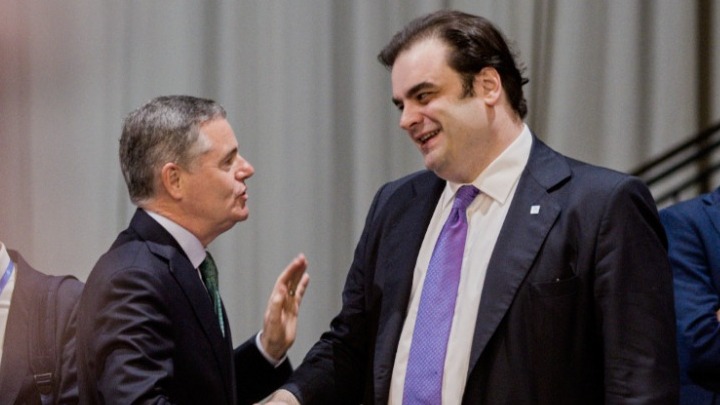The thematic discussion on innovation and digitization was coordinated during the informal ECOFIN in Copenhagen by the Minister of National Economy and Finance, Kyriakos Pierrakakis, as invited by the Danish presidency.
During the meeting, the ministers exchanged views on reforms that could provide greater impetus for growth, as well as on the prioritization of strategic sectors and addressing barriers that slow down the technological transformation of Europe.
Mr. Pierrakakis, leading the discussion, shared with his European counterparts his personal experience from the digital transformation of the Greek state. He emphasized that promoting innovation and digitization is a central lever for enhancing productivity and competitiveness in Europe. He pointed out the need to complete the single market, as proposed by the Letta and Draghi reports, with an emphasis on eliminating the “invisible barriers” that fragment the economy and limit scale. “We need a change in mindset regarding how we perceive competition, so that more European champions can be created and the single market can be leveraged to achieve economies of scale,” he stressed.
At the same time, he highlighted the need to complete the Union of Savings and Investments. As the Greek minister noted, the European Investment Bank has contributed to supporting start-ups through the European Investment Fund; however, it is essential for European start-ups to have the conditions to grow within the EU and at scale. Crucially, he added, is the change in the way public contracts are awarded and the reduction of their implementation time. The experience of the pandemic and the European digital certificate highlighted the importance of interoperability of services at a pan-European level. “The benefits for citizens and businesses will be enormous if we manage to achieve this in practice,” Mr. Pierrakakis emphasized.
At the national level, he insisted on the need for targeted reforms. More specifically, he proposed the establishment of Digital Governance ministries in all member states, the creation of unified government portals, such as gov.gr, the adoption of digital identity, modernization of mobile and fixed broadband networks, and providing tools to small and medium-sized enterprises. He also emphasized that, at a political level, opportunities outweigh the spectrum of difficulties: “Some reforms, such as digital transformation, are extremely popular and can be implemented immediately. The changes are exponential, and governments must support those at risk of being left behind, so that the digital transition is fair, effective, and overall beneficial for society and the economy.” After the thematic session, Mr. Pierrakakis presented the conclusions of the discussion to the plenary of ECOFIN, in the presence of the President of the European Central Bank, Christine Lagarde, the European Commissioner for Economy, Valdis Dombrovskis, and the IMF Director for Europe, Alfred Kammer. The International Monetary Fund has prepared a relevant report on the structural reforms it considers necessary to promote at the European level.
In the preceding informal Eurogroup meeting, Mr. Pierrakakis referred to the consequences of the complexity of the Union’s regulatory framework. The minister emphasized the need to create a single European tool for quantifying administrative burdens, proposing that it be linked to the General Accounting Offices of the member states. He presented the Greek experience with the MITOS platform as a good practice and stressed that similar simplification initiatives should also be promoted in financial legislation, in a way that ensures financial stability, public finances, and consumer protection.
At the Eurogroup, a political agreement was reached on the process for determining the upper limit for holding digital euros, with a clear delineation of the roles of the Council and the ECB. “The opportunity cost of delaying the adoption of the digital euro is significant. Therefore, it is necessary to proceed at a rapid pace so that Europe does not fall behind in global competition,” the Greek minister emphasized in his intervention.
On the sidelines of the meetings, Mr. Pierrakakis visited the UNICEF Supply Chain Center and the UN offices in Copenhagen. The visit took place in anticipation of the establishment of the International Supply Chain Center of the IOM in Thessaloniki, aimed at exchanging best practices and maximizing benefits for the Greek economy. (20/9/25)
 go to the original language article
go to the original language article
